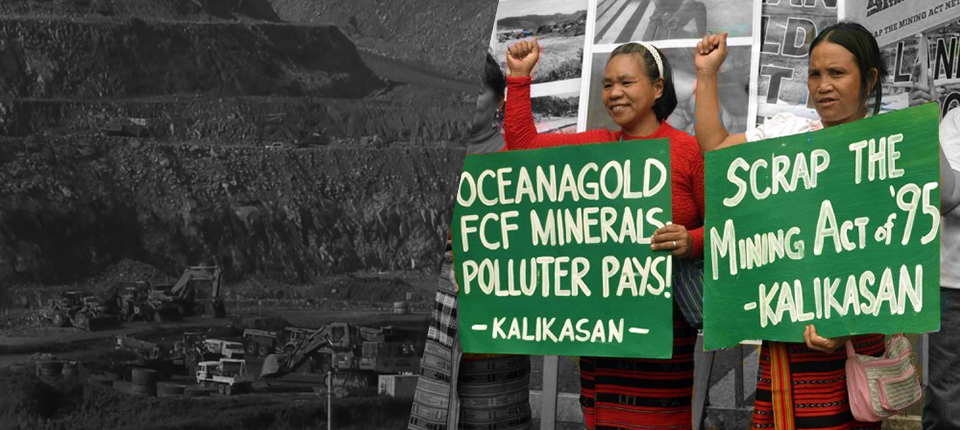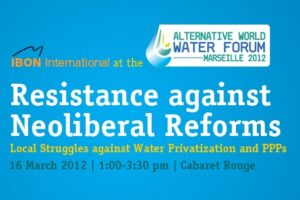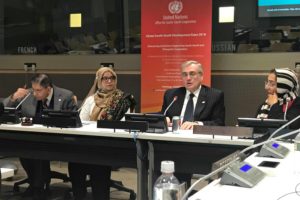Photo: Mining site at Didipio (left, from Pinoy Weekly) and indigenous peoples' calls on big mining (right, from Bulatlat)
The following is an excerpt from the first issue of TNC Watch, a new series on transnational and multinational corporations that violate people's rights. Read the paper here.
Aside from the three Northern operations in the United States and New Zealand, OceanaGold has also shown extensive interest in operating in Southern countries such as the Philippines and El Salvador – to varying success for the company. But both cases reveal the danger of persisting neoliberal institutions and norms from which OceanaGold and other transnational corporations benefit.
El Salvador: Exposing the pitfalls of the neoliberal trade and investment regime
This junior mining TNC enters the picture in El Salvador through the investor-state arbitration case between OceanaGold/Pac Rim Cayman LLC and the Republic of El Salvador, which the former filed at the International Centre on the Settlement of Investment Disputes (ICSID) of the World Bank Group. OceanaGold became embroiled in the case when it bought the Pacific Rim Mining Corporation (which owns Pac Rim Cayman LLC) and its mining projects in 2013.
In 2009, the “investor” Pac Rim Cayman LLC initiated the arbitration case against the Salvadoran government. The government supposedly violated the Central America-United States-Dominican Republic Free Trade Agreement (CAFTA) when it “wrongfully refused to grant environmental permits”[i] and “fail[ed] to protect investments.”[ii]Later on, the ICSID deemed it impossible for Pacific Rim to invoke CAFTA, thus Pacific Rim instead argued that El Salvador violated its own investment laws.[iii]
The case between OceanaGold/Pac Rim Cayman LLC and El Salvador is one among the various Investor-State Dispute Settlement (ISDS) cases against governments around the world. According to the Asia-Pacific Research Network, ISDS allows TNCs to “bypass” national courts as well as “challenge state policies that are meant to protect public welfare.”[iv]
The ICSID decision came in October 2016, with a loss for OceanaGold/Pacific Rim’s USD 250-million claim for compensation and a victory for the Republic of El Salvador. To cover the legal costs, the ICSID also decided that OceanaGold should pay USD 8 million to the government. Campaigners supported the Salvadoran Roundtable in Metallic Mining to further bring the TNC into account, demanding OceanaGold and its affiliates leave El Salvador; and co-operate in an impartial investigation of corporate mining-related killings.[v]
Despite this victory, CSOs argue that the ISDS case against El Salvador “should never have taken place,” and demonstrates the abuse linked to ISDS provisions.[vi]
Philippines: Continued open-door policy for foreign corporate mining interests
OceanaGold operations in the Philippines, meanwhile, are notable for being called the company’s “flagship operation.”[vii] OceanaGold has been extracting mineral resources at the Didipio Gold-Copper Mine in the province of Nueva Vizcaya (located 270km North of Manila).The Didipio Gold-Copper Mine Project, estimated to have 1.59 million ounces of gold and 0.21 metric tonnes of copper reserves, started its commercial operations in 2013. Its operations started with a five-year tax holiday; the gold and copper reserves could be mined for 27 years. [viii]
In 2006, OceanaGold bought Climax Arimco Mining Corporation and the Didipio project, resulting to the subsidiary OceanaGold Philippines, Inc. (OGPI). OGPI is a wholly-owned subsidiary of the OceanaGold parent company.[ix] They also acquired Climax Arimco’s Financial or Technical Assistance Agreement (FTAA), which are mining contracts that “allow up to 100% foreign equity participation/ownership” (emphasis added).[x]
The rules for FTAAs have been codified in the Mining Act of 1995 (Republic Act 7942) and its Implementing Rules and Regulations. This “open-door policy” enshrined in the mining liberalisation law provides tax holidays, the “right” of a mining TNC against government expropriation, among various incentives. Thus for critics, this law “promotes and implements destructive, irresponsible mining.”[xi]
Recent prospects for ending the blanket liberalisation policy were quickly reversed with the replacement of an environment secretary who launched an anti-mining drive.[xii] According to Joey Leviste Jr., Vice-President of the Philippine Chamber of Mines, this is a signal from the Philippine legislative that they “welcome good investment policy.“ [xiii] Leviste Jr. is also the Chairman of OceanaGold Philippines Inc., and a member of the Board of Directors of OceanaGold Corporation (the parent company).###
[i] https://www.state.gov/s/l/cafta6/c33258.htm
[ii] https://www.italaw.com/sites/default/files/case-documents/ita0590.pdf
[iii] https://www.theguardian.com/sustainable-business/2015/may/27/pacific-rim-lawsuit-el-salvador-mine-gold-free-trade
[iv] http://aprnet.org/?p=455
[v] http://www.stopesmining.org/j25/index.php?option=com_content&view=category&layout=blog&id=97&Itemid=526
[vi] http://www.stopesmining.org/j25/index.php?option=com_content&view=category&layout=blog&id=97&Itemid=526
[vii] https://www.oceanagold.com/wp-content/uploads/2016/10/161004-Philippines-Update-News-Release.pdf
[viii] http://www.manilatimes.net/oceanagold-pays-p92-2m-fees-vizcaya-town/345386/
[ix] https://www.oceanagold.com/about-us/board-of-directors/
[x] Mines and Geosciences Bureau, Region 10. “Revised IRR of the Mining Act of 1995.” http://www.mgb10.com/policies/REVISED%20IRR%20OF%20MINING%20ACT%20OF%201995.pdf
[xi] http://bulatlat.com/main/2011/02/18/letter-to-the-editor-government%e2%80%99s-mining-policy-promotes-destructive-irresponsible-mining/
[xii] https://www.rappler.com/nation/147439-result-mining-firms-audit-denr
[xiii] http://bworldonline.com/ca-confirms-cimatu-environment-secretary/



